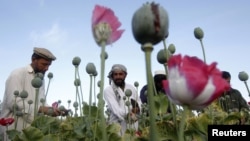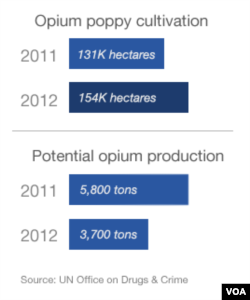ISLAMABAD —
A report Tuesday from the U.N. Office on Drugs and Crime (UNODC) said the amount of Afghan farmland planted with opium poppies has increased by nearly 20 percent this year.
Record high prices for opium combined with corruption and a lack of security is encouraging farmers around the country to turn again to the illegal but high-value crop.
The figures for 2012 are alarming, said Jean-Luc Lemahieu, head of the U.N. Office on Drugs and Crime.
"An increase of 18 percent is a serious alarm signal, it's a wake up call," he said. "The gains made over the last years have been undone. We are again with the kind of figures in parallel to the high peaks of 2008, 2007, 2006. Now this country, working towards transition, can ill afford this."
Ninety-five percent of the poppy cultivation is taking place in western and southern Afghanistan, areas affected by fighting with the Taliban.
Lemahieu said the insurgency is one of the main beneficiaries of the drug trade. But he also blames corruption, the lack of rule of law, local conflicts and the government's apparent lack of interest in dealing with the problem.
Despite years of eradication efforts, the Afghan Interior Ministry finally made poppy eradication one of its top ten priorities just three days ago.
"It took too long," Lemahieu said. "And this hesitation is what is problematic to us."
According to the United Nations, although poppy growing has increased and is expected to go up next season, overall production of opium is down. But the drop is mainly because of bad weather and plant disease.
Muzamel Shinwari, Afghanistan's deputy minister for trade, said the country has been trying to diversify its exports to give farmers an alternative.
"The only product that can counter the illegal export of drugs is saffron, and we are focusing on that," Shinwari said. "It is quite expensive and there is a good market."
Seventeen out of Afghanistan's 34 provinces have been declared poppy-free.
Record high prices for opium combined with corruption and a lack of security is encouraging farmers around the country to turn again to the illegal but high-value crop.
The figures for 2012 are alarming, said Jean-Luc Lemahieu, head of the U.N. Office on Drugs and Crime.
"An increase of 18 percent is a serious alarm signal, it's a wake up call," he said. "The gains made over the last years have been undone. We are again with the kind of figures in parallel to the high peaks of 2008, 2007, 2006. Now this country, working towards transition, can ill afford this."
Ninety-five percent of the poppy cultivation is taking place in western and southern Afghanistan, areas affected by fighting with the Taliban.
Lemahieu said the insurgency is one of the main beneficiaries of the drug trade. But he also blames corruption, the lack of rule of law, local conflicts and the government's apparent lack of interest in dealing with the problem.
Despite years of eradication efforts, the Afghan Interior Ministry finally made poppy eradication one of its top ten priorities just three days ago.
"It took too long," Lemahieu said. "And this hesitation is what is problematic to us."
According to the United Nations, although poppy growing has increased and is expected to go up next season, overall production of opium is down. But the drop is mainly because of bad weather and plant disease.
Muzamel Shinwari, Afghanistan's deputy minister for trade, said the country has been trying to diversify its exports to give farmers an alternative.
"The only product that can counter the illegal export of drugs is saffron, and we are focusing on that," Shinwari said. "It is quite expensive and there is a good market."
Seventeen out of Afghanistan's 34 provinces have been declared poppy-free.






